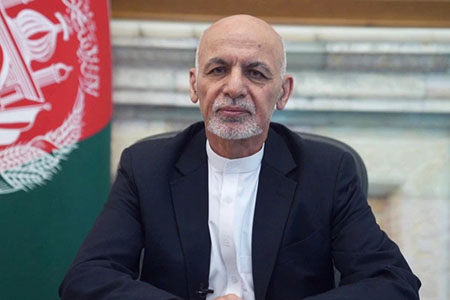Special to WorldTribune.com, August 30, 2021

Corporate WATCH
Commentary by Joe Schaeffer
Afghanistan’s former president Ashraf Ghani is being accused of hot-footing it out of his suffering country with “duffle bags full of cash totaling $169 million.” Whatever the full truth of the matter may turn out to be, Ghani’s hurried skedaddle marks a feeble ending for a man whose nation-building theories embracing globalization once attracted the financial support of towering moneyed internationalist forces such as notorious progressive billionaire George Soros, the Rockefeller Brothers Fund and the Clinton Global Initiative.
Eight years before assuming the presidency in Afghanistan In 2014, Ghani co-founded the Institute for State Effectiveness, an NGO dedicated to remodeling nationhood to fit into the economic machinery of the globalized world of the 21st century.

The ISE website openly acknowledges receiving funding from Soros and the Rockefeller Brothers Fund, among other internationalist heavyweight organizations. RBF in turn boasts of its support of ISE since 2007, explaining the reasoning behind its enthusiasm thusly (bold added throughout this column):
In the face of destabilizing processes of globalization, the ISE approach exemplifies the Fund’s belief that capable, accountable states that can perform core functions for their citizens at home and fulfill their international obligations in an interconnected state system is key to preventing conflict and building peace.
The New York Post reported Aug. 28 that ISE was backed by the Clinton Global Initiative to the tune of tens of millions of dollars:
Ashraf, 72, became Afghanistan’s president in 2014, but before that he raked in hundreds of thousands annually as chair of the Institute for State Effectiveness, a Washington, DC, nonprofit he co-founded in [2006]. The group works to “develop integrated approaches to state building” and around 2007 received a $40 million grant from the Clinton Global Initiative, the non-profit founded by the former president.
In an Aug. 22 piece, Pat Droney at Law Enforcement Today attempted to untangle the sticky globalist web around Ghani’s son Tarek:
So, what are Ghani’s ties to the Washington, D.C. swamp? Joe Biden’s transportation secretary Pete Buttigieg. According to FrontPageMag, during Buttigieg’s failed presidential run in 2019/2020, Ghani’s son, Tarek Ghani was a foreign policy adviser to Buttigieg.
Ghani was also a senior economic advisor to the Soros International Crisis Group. This isn’t a George Soros endeavor but rather was started by his equally socialist brother Paul Soros.
Tarek Ghani is also tied to an organization called the Center for Global Development, an organization which “works to reduce global poverty and improve lives through innovative economic research.”
Among financing sources include the Bill & Melinda Gates Foundation, Bloomberg Philanthropies, the Ford Foundation, and the Gates Policy Initiative, a virtual who’s who of leftists.
The Board of Directors includes former Secretary of the Treasury under Bill Clinton Lawrence Summers, who also was director of the National Economic Council for the Obama administration between 2009-2011.
What a network indeed.
A look at just what Ashraf Ghani was proposing during his incubation stage at the Institute for State Effectiveness before he moved on to taking over the governance of Afghanistan reveals the disturbing fact that a “democratic” Afghanistan was designed to be a post-national New World Order state.
ISE co-founder Clare Lockhart has also served as Director of the Market Building Initiative at the well-heeled internationalist organization The Aspen Institute. In 2009 Ghani and Lockhart co-wrote a book titled “Fixing Failed States,” which is about, well, just what the title says. Here is how The Aspen Institute described the work:
The authors explain the failure stems in part from an outmoded vision of the state system based on the framers of the post-World War II order’s vision: relatively independent, unified states that control markets and rely on authoritarianism when necessary. The world we actually live in is far different. Identities and loyalties don’t necessarily correspond to traditional nation-states, and nations are far less autonomous than in the past. The task at hand, they argue, is to develop novel strategies informed by the realities of our fully globalized world. International institutions, therefore, should prioritize fostering mutually reinforcing bonds between states, civil societies, and markets.
In other words, modern nations today must overcome “outmoded” ideas of independence and understand that they are welded to a global market that will determine much of their existence.
Future Afghan prez Ghani and Lockhart also co-wrote a 2006 article for Swamp think tank behemoth the Brookings Institution. Its title: “An Agenda for Harnessing Globalization.” They weren’t trying to hide it, folks. In the article, the pair assert that countries that think only in terms of their own national interest need to be fixed:
In reaction to globalization, issues are being defined reactively in national terms, resulting in a lose-lose proposition instead of harnessing and leading globalization toward global prosperity. The international regimes for dealing with intellectual property rights and management of international currency relationships, for example, are becoming increasingly contested. Some governments are either actively colluding with or outright protecting local industries that violate intellectual property rights, thereby requiring huge investments from global firms in protecting their brands.
By the way, Ghani’s wealthy and connected son Tarek is a “Nonresident Fellow” at Brookings.
In 2005, Ashraf Ghani gave a TED Talk devoted to elaborating his vision of a One World Order. From the 2:59 mark of his remarks:
We live in one world. But that’s easily said. But we are not dealing with the implications of the one world that we are living in. And that is that if we want to have one world, this one world cannot be based on huge pockets of exclusion, and then inclusion for some. We must now finally come to think about the premises of a truly global world, in relationship to the regime of rights and responsibilities and accountabilities that are truly global in scope. Otherwise we will be missing this open moment in history, where we have a consensus on both the form of politics and the form of economics.
The more this man’s background is looked into, the easier it will be to understand just why his government melted away before the Taliban in a sea of abject cowardice despite the billions of dollars from U.S. taxpayers that were fruitlessly spent to prop it up.
Joe Schaeffer is the former Managing Editor of The Washington Times National Weekly Edition. His columns appear at WorldTribune.com and FreePressInternational.org.
INFORMATION WORLD WAR: How We Win . . . . Executive Intelligence Brief
